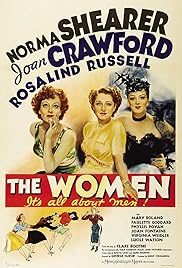WOMEN, THE
(director: George Cukor; screenwriters: Jane Murfin/Anita Loos/based on the play by Clare Boothe; cinematographer: Oliver T. Marsh/Joseph Ruttenberg; editor: Robert J. Kern; music: Edward Ward, David Snell; cast: Norma Shearer (Mary Haines), Joan Crawford (Crystal Allen), Rosalind Russell (Sylvia Fowler), Mary Boland (Countess DeLave), Paulette Goddard (Miriam Aarons), Joan Fontaine (Peggy Day), Lucile Watson (Mrs. Morehead, Mary’s mother), Phyllis Povah (Mrs. Phelps Potter, Edith), Virginia Weidler (Little Mary), Marjorie Main (Lucy), Dennie Moore (Olga, manicurist), Cora Witherspoon (Mrs. Van Adams); Runtime: 132; MPAA Rating: NR; producer: Hunt Stromberg; Warner Bros.; 1939)
“It’s the irrevocable women’s pic of the 1930s.”
Reviewed by Dennis Schwartz
George Cukor (“Adam’s Rib”/”My Fair Lady”), known as Hollywood’s leading “women’s director,” cunningly directs this all-female cast film from a biting but trivial hit Broadway play by Clare Boothe. It’s the irrevocable women’s pic of the 1930s. The “catty” women’s pic is an entertaining bitching fest written by Jane Murfin and Anita Loos (called in to cleanup the censored racy dialogue with snappy lines). There are 135 speaking parts for chicks in this theatrical comedy with men on their minds, who are expressing a women’s point of view about divorce and rivalries as never before on film though it’s in no way a woman’s lib film. A lesser version was remade as The Opposite Sex in 1956. Parts of the B&W film are in color (the fashion show). Joan Crawford, the film’s homewrecker, puts her spin on things in the conclusion by saying: “There’s a name for you ladies, but it isn’t used in high society—outside of a kennel.”
Big-mouth gossipy society woman Sylvia Fowler (Rosalind Russell) is in a swanky Park Avenue beauty salon having her nails painted “jungle red” when the loose-tongued manicurist Olga mentions that Stephen Haines, the ideal husband of her contented wealthy society friend Mary Haines (Norma Shearer, the widow of MGM boss Irving Thalberg), is having a heated affair with department store perfume clerk Crystal Allen (Joan Crawford). Sylvia quickly gets the news out to her Park Avenue crew and then sends the sweet Mary to the same manicurist, where she learns about her husband’s indiscretion. Mary’s mother Mrs. Morehead (Lucile Watson) offers motherly advice, to keep silent and ignore the advice of her friends. But at a fashion show, Mary unexpectedly meets the scheming gold digger Crystal. The meeting erupts into a confrontation that makes the society columns.
Mary heads by train to Reno to stay at an all-female dude ranch while waiting for her divorce, after ten years of marriage and a wonderful daughter named Little Mary (Virginia Weidler), where she meets other women also going there for a divorce. The women include her confused friend Peggy Day (Joan Fontaine), who left her new hubby, as well as Miriam Aarons (Paulette Goddard) and the Countess De Lave (Mary Boland). The Countess character was based on a cafe society dame of that era, the Countess DiFrasso, who had a brief fling with Gary Cooper. Peggy soon goes back to be reunited with her husband, the Countess falls for a singing cowboy and he becomes her fourth hubby, while the more sophisticated Miriam counsels her to swallow her pride and go back to Stephen. But it’s too late, as Crystal got her claws into Stephen and they marry.
The tale picks up two years later and Crystal is bored with the marriage, and turns to the Countess’s cowboy hubby for an affair. When Little Mary tells mom how miserable Stephen is in the marriage, Mary goes all gooey-eyed and teary to take her philandering ex-husband back by any means possible. Stephen is willing to reconcile when he learns of Crystal’s indiscretion that’s inadvertenly made public by the always nasty Sylvia, who is Crystal’s new best friend.
The fun part of The Women comes with the knowledge that the rival actresses also feuded off-screen; the spats ranged from who would get top billing (it was settled that Shearer, Crawford and Russell would all share top billing) to Crawford resenting that Shearer always got the juiciest parts from the studio because of her connections. Their personal feuds rivaled in intensity the film’s venom spewed of maligning gossip, catty asides and insinuations of husbands’ extra-marital affairs.

REVIEWED ON 1/18/2007 GRADE: B